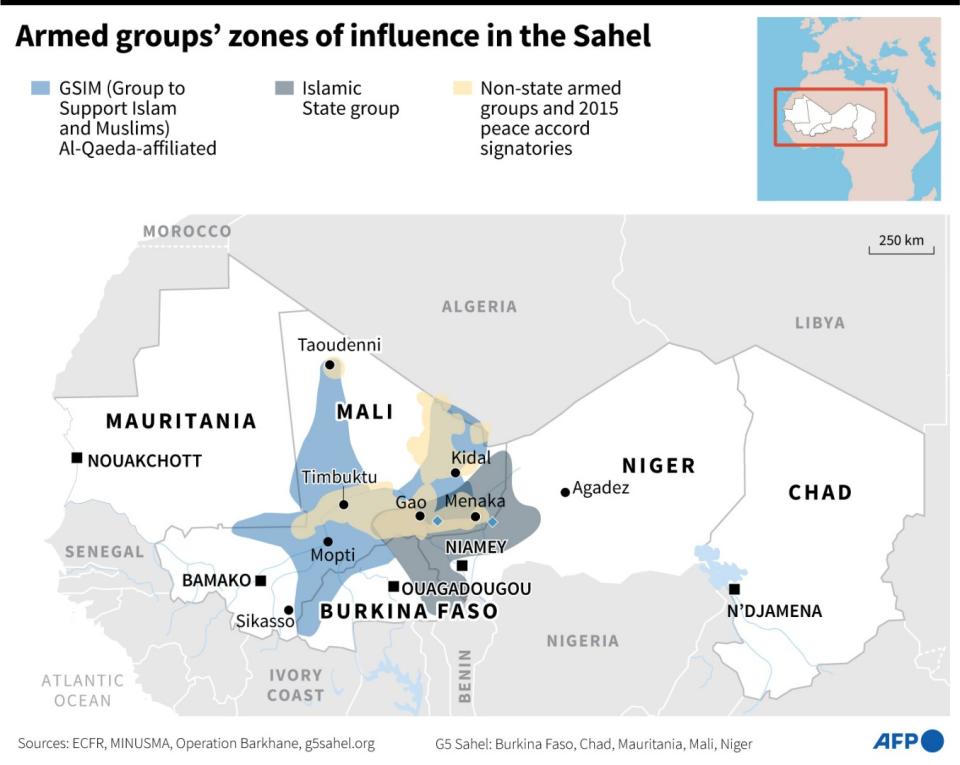On July 6, 2024, the military regimes of Burkina Faso, Mali and Niger signed a treaty called the “Confederation of Sahel States” in Niamey, cementing their departure from the Economic Community of West African States (ECOWAS). A day later, Facebook posts circulated in Ethiopia claiming the three nations had created an entirely new country governed by a common constitution with a single currency. However, this is false: under the terms of the agreement, the member states retain their sovereignty. The main purpose of the pact is to promote cooperation in areas of common interest, such as defence and trade.
An Amharic post published on July 7, 2024, reads: “The West African countries of Burkina Faso, Niger and Mali were united.”
A graphic shared with the post shows a map of Africa and the military rulers of Burkina Faso and Mali, and is headlined: “A new country.”
Described in the post as a “merger”, the claim adds that “this unification journey, which started by expelling the former colonialist France et al, finally united these countries in the Sahel region in a confederation.”
It continues: “Accordingly, the merging state which was named the ‘Confederation of Sahel State/AES’ will have a common constitution, a common currency, a common defence force, a common embassy, and a common passport.”
Similar posts were also shared here and here.
ECOWAS fallout
The governments in Mali, Burkina Faso, and Niger were ousted in military coups in 2020, 2022 and 2023 respectively.
In turn, ECOWAS suspended each of the new regimes from the regional bloc and imposed strict sanctions on Niger and Mali (archived here).
Amid deteriorating relations, the three countries announced their withdrawal from ECOWAS in January 2024, accusing the group of being ineffective in fighting the Jihadist insurgency in the region and of being manipulated by former colonial power France (archived here).



A month later, regime leaders restated their intention of forming an alternative to ECOWAS to be known as the Alliance of Sahel States, or AES (archived here).
At an inaugural meeting in July, they signed a charter establishing the framework for the new alliance.
However, the posts describing this moment as a “merger” are false.
No unification arrangement
The military leaders of the AES officially signed a treaty on July 6, 2024, at their first summit in the Nigerien capital Niamey (archived here).
Using a keyword search in French, AFP Fact Check found a copy of the AES charter published by RTB, a state broadcaster in Burkina Faso (archived here).
The charter is signed by the leaders of the founding countries: Burkina Faso’s Ibrahim Traore; Mali’s Assimi Goita; and Niger’s Abdourahamane Tiani.
AFP Fact Check scrutinised the 10-page document and found there is no mention of establishing a merged state with a single constitution and passport.
“The confederation is based on the principle of sovereignty and territorial integrity,” reads Article 3 of the charter.
Similarly, Article 4 provides that the three states shall cooperate in matters of defence and security, diplomacy and development while “retaining their independence and sovereignty”.
There is nothing in the treaty about a single currency, either, although the idea was raised in earlier talks and is a possibility in the future (archived here).
Rather, the charter commits the member states to cooperate as regional partners in sectors such as security and trade.
“The confederate states cooperate on economic and financial progress with a view of carrying out structuring investments,” the charter stipulates.
Mali will head the AES for the first year.





